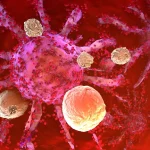For any questions:
Cancer
Normally, your body’s cells grow in a controlled manner. They divide when necessary and die when they have divided too many times or when they are damaged.
However, when cells in healthy tissue multiply abnormally, this leads to the formation of a mass called a tumor. There are two types of tumors: benign tumors and malignant or cancerous tumors.
Oncology is the medical discipline devoted to the study of these tumors. In order to treat cancer patients, physicians must receive specialized training in oncology. The role of an oncologist is to make a diagnosis, offer the appropriate treatment (surgery, radiotherapy, chemotherapy, hormonal therapy, immunotherapy and targeted drugs) and monitor the evolution of the illness.
Benign tumours
Benign tumors are not cancerous. They tend to develop slowly and remain in the same place, compressing the surrounding tissue without spreading to other parts of the body. They are rarely life threatening and will heal after removal without risk of recurrence.
Malignant or cancerous tumors
The cells of a cancerous tumor have the ability to spread to other tissues through the blood or lymphatic vessels to form new tumors called metastases. Malignant tumors are poorly defined and can attain a very large volume. Consequently, they are more difficult to remove than benign tumors, and the risk of recurrence is far higher.
How can cancerous tumors be detected?
The purpose of screening is to attempt to detect cancer even before tangible symptoms appear. The earlier the tumor is detected, the more effective the treatment will be.
There are several screening tests, such as mammography for breast cancer, the fecal occult blood test for colorectal cancer, or the Pap test for cervical cancer. However, the only sure way to diagnose a cancer tumor is by performing a biopsy and analyzing the sample for the presence of cancer cells.





































